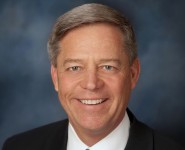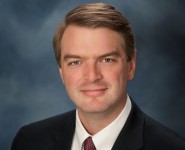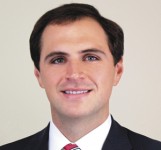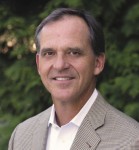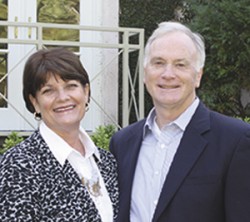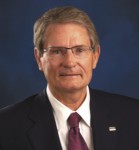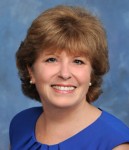As a young businessperson, one of the most influential books on my thinking was Stephen Covey’s “The Seven Habits of Highly Effective People.” One of the seven habits he described was to “begin with the end in mind.” I continually come back to this important idea. As the old expression goes, “If you don’t know where you are going, then any road will take you there.” If we don’t know where we are heading in life or business, then we are simply consumed in busyness with no clear purpose. We are like Taz, the Tasmanian devil Looney Tunes cartoon character, whirling around in a frenzy of motion. Okay I know I may have dated myself a little with that reference, but at least my younger readers have access to YouTube and can check out Taz!

Martin Willoughby
As much as we might want to deny the fact, we are all mortal and have seasons of life. Businesses similarly have seasons as well. There are the exciting startup days when passionate entrepreneurs try to launch businesses into existence. For those businesses that survive this phase (most don’t), they hopefully enter a nice phase of growth as they scale toward their full potential. At some point, most businesses plateau and begin a gradual decline until they reach some end point such as dissolution, bankruptcy or sale. Of course, mature businesses can have seasons of growth and renewal as well, with new products or services, and a very small number of companies will eventually become publicly traded.
I used to do a fair amount of estate planning. I found that most people don’t like to talk about planning their estates. I get that. Making plans for dying is not exactly on anyone’s Top 10 list of fun things to do. Similarly, I find that very few business owners spend much time talking about the inevitable transition of their business. Since there is still a 100 percent mortality rate, the question is not if, but when, a transition will occur in a business. Business transitions are not all triggered by death. For example, the triggering event could also be a partnership dispute, disability, divorce, or simply a desire to work less or retire.
I have found that there are some common reasons why people put off thinking about succession/exit planning for their business. Probably the most common is simply the tyranny of the urgent. The pressures of the “now” take precedence, and long-range succession planning stays unattended to in the important, but not urgent, bucket of things to do. Others are uncomfortable discussing this topic with family or partners, so they simply don’t. Some owners simply don’t have the advisors around them to properly think through the issues. Successfully operating a business and successfully transitioning a business are two different things and usually require different skill sets.
Chris Mercer, founder of Mercer Capital, presents a compelling case in his book “Unlocking Private Company Wealth” that there is a tremendous need for business owners to better keep the end in mind and consider ways to diversify their wealth away from their closely held business. For more than 75 percent of business owners, their business represents more than 50 percent of their net worth. Mercer points out that most people spend more time professionally managing their liquid wealth (e.g., stocks, bonds, etc.) than they do their illiquid wealth (their business). Managing your business is not exactly the same thing as managing the asset of your business. By viewing your business as an asset, you can reshape how you view your expected returns and target performance.
I have summarized below a few considerations when thinking about the transition of your business:
Do You Have a Plan for Involuntary Transitions?
I’m amazed at the number of successful businesses that don’t have a written plan for involuntary transitions like death, divorce, disability and shareholder disputes. While you can’t plan for every contingency, it is highly advisable to make sure that you plan for some common situations that can occur. This is typically done in the form of a buy-sell agreement with the owners of the business. I also recommend that business owners (particularly sole owners) have written instructions on how they want the affairs of the business to be handled and keep critical information easy to find. I lost a business partner at a very young age, and I learned first-hand how important this type of planning is for the business and the family. It is easy to procrastinate on these issues, so don’t delay!
Do You Have a Plan for Voluntary Transitions?
I regularly visit with business owners who desire to spend more time away from their business to better enjoy their family and golden years. The challenge is to define a target date for a transition from the business and what that transition actually means. I find that some people want to always stay engaged with the business while others would like to hand off the keys and sail into the sunset. It is important to clarify your personal goals so you can plan for a successful transition.
Have You Identified Who You Would Like to Take Over Your Business?
Is there a family member who has the aptitude and interest, an employee or perhaps a third party? Answering these questions will be critical to developing a realistic plan for succession. Most importantly, you want to begin as early as possible in your planning. I find many family-owned enterprises plan three to five years in advance. If you are behind in your planning, the best time to start is today!
Do You Know the Value of Your Company and Your Financial Needs?
Many business owners don’t really know the value of their business. Savvy owners often have an annual appraisal to see how their asset is performing. It is important to be able to look objectively at your company’s valuation. Remember, a business is only truly worth what someone will pay for it.
I also encourage business owners considering a transition to carefully evaluate their cash flow needs. Often, owners fail to consider all of the “perks” that they enjoy as the owner of the business that they would not have if there were a different owner. I recommend a thorough review of the cash flow needs of owners so that they don’t find themselves cash poor after a transition.
It is easy to mistake succession planning as a transaction rather than a process. In reality, business owners should be treating their business as an asset and actively managing that asset in addition to managing the business. They should consider their investment returns and whether they are growing their wealth. In addition, proactive planning for the inevitable transitions that will occur is simply the prudent thing to do. There is a tremendous amount of wealth that will be transitioned in the upcoming years (estimated to be as high as $ 10 trillion). This is an important topic that I hope thoughtful business owners will actively address.
[Originally published in
Pointe Innovation, the quarterly publication of
Innovate Mississippi, in its Winter 2014 issue.
Read More



